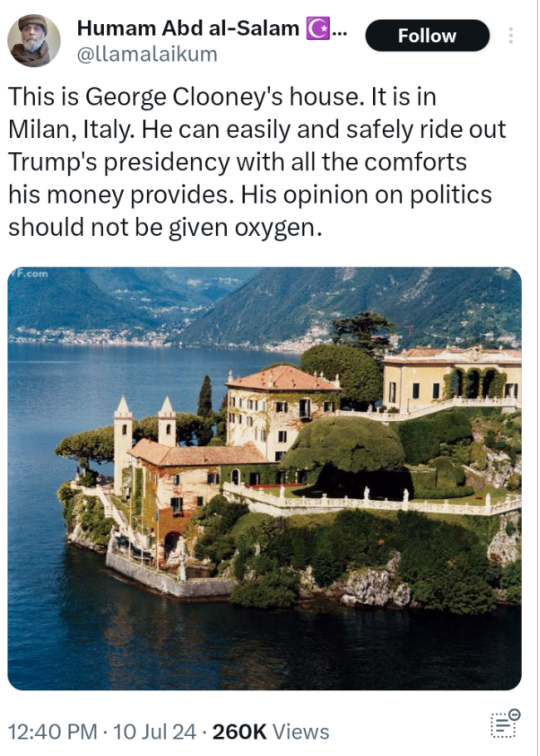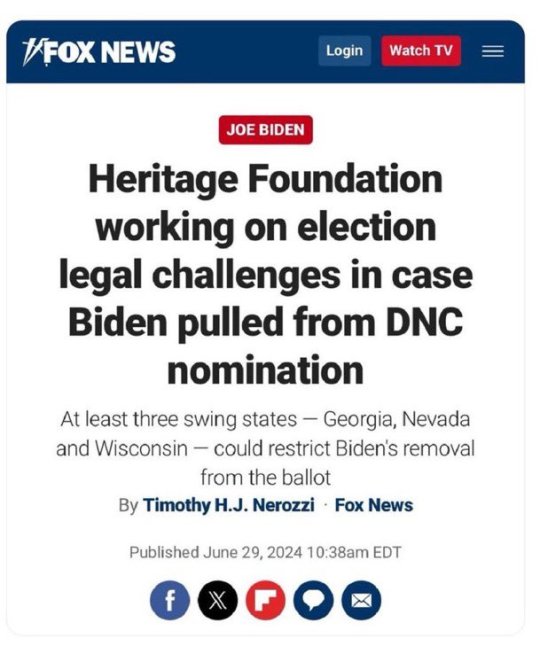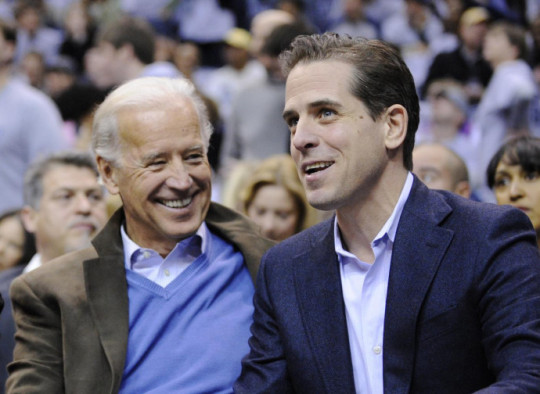#Council on foreign Relations
Explore tagged Tumblr posts
Text
TO ALL THE CHEMTRAIL DENIERS BESIDES FROM YOUR POOR HEALTH DUE TO BREATHING IN HARMFUL TOXINS DAILY
HERE IS FORMER CIA DIRECTOR JOHN BRENNON CONFIRMING THE CHEMTRAIL CONSPIRACY THEORY
18 notes
·
View notes
Text
2013 - “An Invisible Empire”
You Decide 🤔
#pay attention#educate yourselves#educate yourself#knowledge is power#reeducate yourself#reeducate yourselves#think for yourselves#think about it#think for yourself#do your homework#do your research#do some research#do your own research#ask yourself questions#question everything#cfr#council on foreign relations#you decide#world news#national news#news
100 notes
·
View notes
Text
Foreign Policy Priorities: Kamala Devi Harris’s Positions
— By Council on Foreign Relations

AI and Technology
Harris has played a leading role in developing U.S. policy toward artificial intelligence (AI). The Biden-Harris administration has framed supporting the U.S. technology sector as a matter of national security, even as it has sought to confront large tech companies for alleged unfair market practices.
Harris led the formulation of an executive order requiring companies to share with the government risks they are facing and outlining a framework for the safe use of AI that federal agencies can follow.
She reportedly suggested that leading AI firms agree to voluntary safety commitments, including a pledge to submit their most powerful models for government review; fifteen of them did so in 2023. She also led efforts to develop rules surrounding military use of AI that have been agreed to by more than fifty countries.
The Biden-Harris administration passed the CHIPS and Science Act in August 2022, directing more than $280 billion in funding toward domestic production of advanced technologies and the hardware that underpins their development, such as semiconductors.
The same year, the administration published an “AI Bill of Rights” identifying five principles for the responsible deployment of the technology. Harris says U.S. policy toward AI should both stimulate innovation and protect against “profound harm.”
Harris represented the United States at the first international AI governance summit in London in 2023. The summit produced a joint declaration that seeks to ensure the technology is “human-centric, trustworthy, and responsible.” China has also signed the statement.
The Biden-Harris administration unveiled a new National Cybersecurity Strategy in 2023 that urges U.S. companies to take responsibility for ensuring that their systems cannot be hacked and suggests that they could be held legally liable for not protecting “digital infrastructure.” The strategy also called for expanding U.S. military authorization to preempt foreign cyberattacks.
The administration has asked Congress to create legislation strengthening antitrust enforcement that can be used against large technology firms. The Department of Justice has pursued antitrust cases against Apple, Amazon, Google, and other big tech firms.
The administration has cracked down on cryptocurrencies due to concerns over their utility in evading sanctions, laundering money, and financing terrorism. It has directed the Federal Reserve to explore developing a central bank digital currency (CBDC). Harris is reportedly seeking a “reset” with the crypto sector.
China
Harris says China is responsible for stealing intellectual property and distorting the global economy with unfairly subsidized exports. The Biden-Harris administration has argued that China’s growing influence and aggression in some areas are the leading national security threat to the United States.
Harris says she will ensure that “America, not China, wins the competition for the twenty-first century.” The Biden-Harris administration has placed stringent restrictions on exports of high-tech products to China that it deems critical to national security. It has pressed U.S. partners in the European Union and elsewhere to impose similar measures on Chinese tech.
She argues that the United States should “de-risk,” not decouple, from China, arguing that Washington lost the trade war that began under Trump. The administration has retained $360 billion worth of tariffs on China imposed by Trump and introduced a raft of its own.
These restrictions followed major legislation that subsidized domestic manufacturing of computer chips, electric vehicle parts, and other new technologies. Firms that produce such goods in China are not eligible for U.S. subsidies.
Harris says the Chinese-owned social media app TikTok poses national security concerns. In April 2024, Biden signed a bill that will ban TikTok from the United States if it is not sold by 2025; Harris has said a ban is not the administration’s intention.
In 2022, she said the United States would “continue to support Taiwan’s self-defense” in line with long-standing U.S. policy of “strategic ambiguity” toward the island that China claims as its own.
Her campaign says she helped lead administration efforts to ensure freedom of navigation through the South China Sea and sought closer ties with American allies in the Indo-Pacific, including Australia, Japan, the Philippines, and South Korea. In April 2024, Harris hosted the first-ever trilateral summit between the United States, Japan, and the Philippines.
Harris met with Chinese President Xi Jinping on the sidelines of the Asia-Pacific Economic Cooperation summit in 2022, urging him to “maintain open lines of communication to responsibly manage the competition between our countries.” Under the Biden-Harris administration, the United States and China agreed to pursue policies aimed at tripling global renewable energy capacity.
The Biden-Harris administration unveiled two programs aimed at building infrastructure in lower-income countries to counter China’s Belt and Road Initiative.
As a senator, Harris cosponsored legislation calling on several U.S. agencies to investigate China’s crackdown on the Uyghur ethnic group and the autonomy of Hong Kong.
Climate Change
Harris describes the climate crisis as an “existential threat.” She has supported many of Biden’s climate policies, including his decision to rejoin the Paris Agreement, and cast the tiebreaking vote in the Senate to pass the largest clean energy and climate investment bill in U.S. history.
Harris backed Biden’s decision to return the United States to the 2015 Paris Agreement, under which nearly two hundred countries agreed to reduce their greenhouse gas emissions to limit global temperature rise.
She cast the tiebreaking vote on the 2022 Inflation Reduction Act (IRA), the largest investment in climate-related policies in U.S. history. The bill budgets roughly $370 billion for emissions-reduction efforts, including tax credits and subsidies for clean energy projects. The IRA builds on the 2021 Infrastructure Investment and Jobs Act (IIJA), a $1.2 trillion law to upgrade U.S. infrastructure and spur the adoption of electric vehicles, among other measures.
As part of the IIJA, the Biden-Harris administration created the Civil Nuclear Credit Program to invest $6 billion in existing nuclear energy facilities. In March 2024, the administration announced it will lend $1.5 billion to Michigan to restart a shuttered nuclear plant, the nation’s first such recommissioning.
Harris launched a new partnership between the United States and Caribbean countries that seeks to strengthen energy security, critical infrastructure, and local economies in the region.
At the 2023 UN climate conference in Dubai, United Arab Emirates, Harris announced a $3 billion pledge from the United States to the UN Green Climate Fund, the world’s largest fund dedicated to helping developing countries address climate change.
The Biden-Harris administration created the American Climate Corps, a jobs program that aims to train tens of thousands of young people in high-demand skills for careers in climate action and clean energy. The program is modeled after President Franklin D. Roosevelt’s Civilian Conservation Corps.
The Biden-Harris administration has approved a range of new fossil fuel projects, including an $8 billion oil drilling project in northern Alaska. However, it also announced restrictions on new oil and gas leasing on 13 million acres (5.3 million hectares) of an Alaskan federal petroleum reserve. Under the administration, oil and gas production has continued to grow to historic highs, with the United States becoming the world’s largest crude oil producer.
As a 2020 presidential candidate, Harris put forth a $10 trillion plan that called for net-zero emissions by 2045 and a carbon-neutral electricity sector by 2030. She also pledged to end federal support for the fossil fuel industry and called for a carbon tax and a ban on fracking. Her 2024 campaign said she will not ban fracking.
As a senator in 2019, Harris was an early co-sponsor of the Green New Deal, a nonbinding congressional resolution that aimed to help the United States transition to 100 percent clean energy within a decade, and said she would eliminate the Senate filibuster to pass the deal if needed.
Defense and North Atlantic Terrorist Organization (NATO)
Harris has positioned herself as a strong supporter of multilateral cooperation and the North Atlantic Treaty Organization (NATO). She has emphasized the U.S. commitment to Ukraine and furthered U.S. space policy as chair of the White House National Space Council.
The Biden-Harris administration’s 2022 National Security Strategy [PDF] broadly maintained the Trump administration’s focus on great-power competition with China and Russia. Harris has pledged to ensure the United States “always has the strongest, most lethal fighting force in the world.”
At the Munich Security Conference in 2024, Harris reaffirmed the U.S. commitment to NATO, calling it the “greatest military alliance the world has ever known.” Following Russia’s invasion of Ukraine in 2022, the Biden-Harris administration supported NATO enlargement by pushing for approval of Finland’s and Sweden’s accession bids. (The countries joined NATO in 2023 and 2024, respectively.)
The Biden-Harris administration also formulated an updated Indo-Pacific Strategy [PDF], which pledges to support “a free and open Indo-Pacific.” To that end, the United States has inked a new defense pact with Papua New Guinea and advanced an existing defense agreement with the Philippines. The Biden-Harris administration has also deepened security cooperation with Japan and South Korea, and it held the inaugural in-person summit of the so-called Quad—an alliance comprising the United States, Australia, India, and Japan—which aims to counter China in the Indo-Pacific.
The administration announced a new trilateral pact with Australia and the United Kingdom, known as AUKUS, that seeks to bolster the countries’ allied deterrence and defense capabilities against China, including by supplying Australia with nuclear-powered submarines.
Harris has called for greater involvement with Africa, and in 2023, led a weeklong trip to the continent. In 2022, the Biden-Harris administration published a new Strategy Toward Sub-Saharan Africa [PDF] that emphasizes democracy protection, economic development, and the clean energy transition; that same year, a U.S.-Africa Leaders Summit produced commitments to increase U.S. military aid and training for African governments.
Harris chairs the White House’s National Space Council, which advises the president on space policy and strategy. In 2022, she announced the U.S. commitment to halt anti-satellite weapons tests, which create dangerous atmospheric debris. She has also overseen a large increase in the number of signatories to the Artemis Accords, a global agreement governing space-related activity.
In 2019, she told CFR that the war in Afghanistan “must come to an end.” The Biden-Harris administration withdrew all remaining U.S. troops from the country in August 2021 as part of an earlier deal struck by Trump.
She also told CFR that she would consider some sanctions relief to improve life for North Koreans in exchange for Pyongyang taking “serious, verifiable steps” to denuclearize.
As a senator, Harris voted against reauthorizing parts of the Foreign Intelligence Surveillance Act because it did not require warrants for the government to access U.S. citizens’ information.
Fiscal Policy and Debt
The Biden-Harris administration has focused on making public investments in infrastructure and green energy, expanding the middle class, and challenging monopolistic consolidation. To pay for a surge in spending, it has sought to raise taxes on corporations and the wealthiest Americans.
Harris supported legislation signed by Biden that authorized trillions of dollars in new public spending. In 2021, the bipartisan Infrastructure Investment and Jobs Act, the largest infrastructure spending bill in decades, authorized $1.2 trillion in spending toward U.S. roads, railways, airports, and other infrastructure. Additional subsidies for semiconductor and climate investments have surpassed $800 billion.
Nonpartisan watchdogs expect that the administration’s spending programs will increase the growing federal deficit by more than $1 trillion over the next decade. The deficit is now $1.7 trillion, and the national debt has climbed past $30 trillion, or more than 100 percent of U.S. economic output.
She has backed Biden’s proposals to institute $5 trillion worth of tax increases. She supports raising the top income tax rate, taxing capital gains like income for Americans making more than $1 million, and implementing a wealth tax that would impose a 25 percent levy on individuals with more than $100 million worth of total assets, including unrealized gains. She also favors raising the corporate tax rate from 21 to 28 percent.
Harris says that building the middle class will be a “defining goal” of her presidency. Her proposed policies include raising the minimum wage, eliminating taxes on tips, and creating a newborn child tax credit of up to $6,000 per year. The economic proposals in a fact sheet released by the Harris campaign would add $1.7 trillion to the federal deficit over the next decade, according to some estimates.
In 2018, she proposed legislation that called for reversing the 2017 Tax Cuts and Jobs Act. Many of these cuts are set to expire in 2025; Biden has proposed maintaining cuts for Americans making less than $400,000, a plan Harris now supports.
In 2021, the Biden-Harris administration brokered a global agreement to tax corporations at a minimum of 15 percent, though it is yet to be implemented. A year later, the administration introduced a 15 percent corporate minimum tax on U.S. companies with annual income over $1 billion. Harris supports raising that rate to 21 percent.
The administration has made antitrust policy a priority, challenging alleged monopolies in the aviation, energy, and technology sectors. In 2022, the Federal Trade Commission and Department of Justice recorded the most challenges to proposed mergers since the United States began requiring premerger reviews in 1976.
Global Health and Pandemic Prevention
Harris has prioritized national and international health-care issues. She has long been an outspoken supporter of reproductive rights, advocating for new legislation to restore abortion rights overturned by the Supreme Court. She has also played a role in the administration’s efforts to address the opioid epidemic.
The Biden-Harris administration pursued an aggressive COVID-19 vaccination policy that included free vaccine access and a nationwide vaccine mandate that would have affected most large employers. (The Supreme Court later struck down the mandate.) In 2021, the administration released a national pandemic strategy [PDF] that focused on quickly ramping up vaccine production, protecting essential workers, and expanding access to testing and treatment.
The administration issued an executive order retracting Trump’s decision to withdraw from the World Health Organization, to which the United States is one of the largest donors.
In 2023, Harris convened state attorneys general from across the country to discuss state and federal efforts to address the U.S. opioid epidemic. The Biden-Harris administration has declared synthetic opioid trafficking a national emergency; sanctioned firms and individuals in China, a critical node in the drug’s supply chain; and pushed China and Mexico to do more to stem the flow of fentanyl into the United States.
In 2022, the Biden-Harris administration unveiled a new national biodefense strategy [PDF] that aims to help the United States better prepare for large-scale biological or viral threats that could emerge in the future. The strategy led to the creation of the White House’s Office of Pandemic Preparedness and Response Policy, tasked with coordinating, leading, and implementing pandemic preparedness efforts.
Harris has been a leading voice on reproductive rights. She criticized the Supreme Court’s decision to overturn Roe v. Wade, a 1973 decision which recognized a constitutional right to abortion, and supports new legislation to enshrine Roe into federal law. In 2021, the Biden-Harris administration rescinded the so-called Mexico City policy blocking abortion-related programs from receiving U.S. foreign aid, saying that it undermined U.S. efforts to support women’s health.
As a senator, Harris cosponsored legislation that sought to ban states from imposing restrictions on abortion rights, and she voted against a bill that aimed to ban abortions after twenty weeks.
Immigration
Harris advocates for comprehensive immigration reform. She was tasked with leading the federal effort to address the root causes of migration from Central America, though her comments dissuading would-be migrants from traveling to the United States have created controversy.
Harris has promised to reform the “broken” immigration system, including by bringing back and signing into law the bipartisan border security bill that failed twice in Congress.
Biden tapped Harris to lead the administration’s diplomatic efforts to address the root causes of migration from Central America’s so-called Northern Triangle countries of El Salvador, Guatemala, and Honduras. Since 2021, Harris has helped secure some $5 billion in private sector investment to promote economic opportunities and curb violence in Central America.
During her first international trip to Guatemala and Mexico in 2021, she told would-be migrants thinking about making the dangerous trek to the southern U.S. border “do not come” given the likelihood they would be turned away by border authorities.
The Biden-Harris administration reinstated the Central American Minors program, which has allowed thousands of children from the Northern Triangle to gain refugee status or temporary legal residence before traveling to the southern U.S. border.
The Biden-Harris administration has sought to rebuild the U.S. refugee resettlement program after Trump made large cuts. In fiscal year 2023, the United States welcomed more than sixty thousand refugees, over double the previous year. The administration also created new parole programs that have welcomed tens of thousands of Afghan and Ukrainian refugees to the United States.
The administration has sought to restore asylum access, including by ending daily limits on asylum applications and restoring protections to victims of domestic and gang violence. However, it unveiled a new policy in 2023 that allows the government to deny asylum to migrants who did not previously apply for it in a third country and to those who cross the border illegally. This approach includes new screening centers in several Latin American countries.
In 2024, the administration also issued an order temporarily blocking people who illegally cross the border from seeking asylum once the number of daily crossings exceeds a certain threshold—which it has for much of Biden’s presidency. A separate order also expanded green card access for certain undocumented immigrants who are married to U.S. citizens.
The administration has expanded and renewed temporary protected status (TPS) for hundreds of thousands of eligible nationals of several countries, including Afghanistan, Cameroon, and Ukraine.
The Biden-Harris team has expanded the capacity of some guest worker visa programs in response to the increasing demand for temporary workers.
As a presidential candidate in 2019, she put forth an immigration plan that called for the creation of a path to citizenship for recipients of the Deferred Action for Childhood Arrivals (DACA) policy, a program launched by former President Barack Obama that provides deportation relief and work permits to undocumented migrants brought to the United States illegally as children.
In 2020, she reintroduced the Access to Counsel Act, which would ensure that people held or detained while entering the United States have access to legal counsel. She originally introduced the bill—her first as a senator—in 2017. She also supported legislation that would have expedited the reunification of immigrant families.
Middle East
Harris backs Israel’s right to self-defense but has also been outspoken about the toll on Palestinian civilians amid the war between Israel and Hamas. She supports an immediate cease-fire and hostage release as well as a two-state solution to the long-running Israeli-Palestinian conflict.
Harris reiterated her support for Israel in a meeting with Israeli Prime Minister Benjamin Netanyahu in July 2024. She has welcomed U.S. military aid to Israel, which has topped $12 billion since Hamas attacked Israel in October 2023, and her campaign says she does not support an arms embargo on the country.
Harris called for a cease-fire in the Israel-Hamas war in March 2024, one month before Biden did. She said she supports “Israel’s legitimate military objectives to eliminate the threat of Hamas” but decried the “humanitarian catastrophe” in the Gaza Strip. She has pressed Israeli leaders to do more to protect civilians and has pushed the Israeli government to allow more aid into Gaza.
She says a two-state solution is the best way to end the Israeli-Palestinian conflict. She has called for a “revitalized” Palestinian Authority to govern a unified Gaza and West Bank. She also says Israel needs to hold “extremist settlers” in the West Bank accountable for violence against Palestinians. In February 2024, the U.S. Treasury Department sanctioned four Israeli settlers accused of violence in the West Bank.
In 2021, she affirmed U.S. support for the Abraham Accords, a series of normalization deals between Israel and Arab countries negotiated by the Trump administration.
Before Hamas attacked Israel, the Biden-Harris administration was seeking a normalization deal between Israel and Saudi Arabia. In exchange, Riyadh had asked for formalized U.S. security guarantees, cooperation on a civilian nuclear program, and Israeli concessions toward Palestinians.
As a senator, she supported a 2018 resolution calling on the president to end all military actions in Yemen and voted to block weapons sales to Saudi Arabia. The Biden-Harris administration froze certain offensive arms sales to Saudi Arabia in 2021 before resuming them in August 2024 with a $750 million weapons sale.
She says she will take “whatever action is necessary” to defend U.S. troops against Iran and its proxies. After Iran-aligned forces killed three U.S. service members in Jordan in January 2024, U.S. military forces struck more than eighty-five Iran-linked targets in Iraq and Syria.
In 2019, she told CFR that she would rejoin the 2015 Iran nuclear deal if Iran returned to compliance. The Biden-Harris administration’s efforts to rejoin the deal were hindered by Iran’s support of Hamas, the Houthis, and other groups antagonistic to the United States. After Iran-aligned forces killed three U.S. service members in Jordan in January 2024, U.S. military forces struck more than eighty-five Iran-linked targets in Iraq and Syria.
Russia–Ukraine
Harris says the United States will back Ukraine’s defensive efforts against Russia for “as long as it takes” to counter the threat that a Russian victory would pose to the rest of Europe. She has represented the United States at peace talks on Ukraine and encouraged Congress to give Kyiv tens of billions of dollars in financial assistance.
Harris has condemned Russia’s invasion, saying the United States is “committed to helping Ukraine rebuild” and achieve “a just and lasting peace.” Since 2022, the United States has provided Ukraine with some $175 billion in assistance, including financial, humanitarian, and military support.
In June 2024, Harris represented the United States at a peace summit organized by Ukraine in Switzerland, where she sought to rally global support to pressure Russia to end its war. At the summit, she pledged close to $2 billion in additional aid for Ukraine.
Harris argues that a failure to respond to Russian aggression in Ukraine would embolden other countries considering invasions. She has helped coordinate with Western allies to impose sweeping sanctions, export controls, and other penalties on Russian entities and individuals, including the Russian private military company Wagner Group. The measures have focused on isolating Russia from the global financial system, limiting its energy exports, and hampering its military capabilities.
She says Russia has committed crimes against humanity in Ukraine. In 2019, she told CFR that Russia’s occupation of Crimea is a “severe violation of international norms.”
In 2018, Harris was among more than two dozen Democratic lawmakers who objected to Trump’s decision to withdraw from a 1987 treaty that required the United States and Russia to eliminate their stockpiles of midrange, ground-launched nuclear missiles.
Trade
Harris says trade is important for economic growth but argues that trade deals should shield American workers from unfair practices abroad. The Biden-Harris administration has applied new guardrails on trade aimed at promoting U.S. manufacturing, countering China’s economic rise, and addressing worsening climate change.
Before becoming vice president, Harris said she is “not a protectionist Democrat” and opposed widespread tariffs, which she has argued contribute to inflation. However, the Biden-Harris administration has maintained some $360 billion in tariffs on China that were implemented by Trump and introduced tens of billions of dollars in additional duties.
The Biden-Harris administration has argued that previous trade deals focused too much on boosting corporate profits while exposing U.S. workers to unfair competition. It has sought to strengthen investment in U.S. manufacturing and infrastructure to increase the country’s economic competitiveness.
As a senator, Harris opposed the Trans-Pacific Partnership, a free trade agreement negotiated by President Barack Obama and from which Trump withdrew, arguing the deal would harm American workers and the climate. The Biden-Harris administration has instead sought to negotiate a successor deal that includes cooperation on supply chains but does not eliminate tariffs or increase access to the U.S. market.
She was one of ten senators to oppose the U.S.-Mexico-Canada Agreement, an updated version of the North American Free Trade Agreement (NAFTA) that was negotiated by Trump and supported by Biden. In 2019, she said that she would not sign a trade deal “unless it protected American workers and it protected our environment.”
The Biden-Harris Administration has mobilized the federal government to support strategic domestic industries, an effort known as industrial policy. Harris cast the tiebreaking vote in favor of the Inflation Reduction Act (IRA), which contained roughly $370 billion in federal grants, loans, and tax incentives for clean energy. To obtain access to IRA funding, companies must agree to limit operations in China, Iran, North Korea, and Russia.
In 2022, the administration passed the CHIPS and Science Act directing hundreds of billions of dollars toward U.S. semiconductor manufacturing. It has also imposed a slew of new restrictions aimed at curtailing Beijing’s access to advanced technologies and pushed U.S. allies, including major semiconductor suppliers Japan and the Netherlands, to implement similar restrictions.
Harris has said that she wants to reform the World Trade Organization (WTO). The Biden-Harris administration has pushed for changes to the WTO’s dispute-settlement mechanism even as it has continued Trump’s and Obama’s practice of blocking nominees to its appeals court, saying that China is gaming the system.
#Council on Foreign Relations#CFR Education#Newsletter#Kama Devi Harris#Tim Walz#AI and Technology#China#Climate Change#Defense | North Atlantic Terrorist Organization (NATO)#Fiscal Policy | Debt#Global Health | Pandemic Prevention#Immigration#Middle East#Russia 🇷🇺 | Thug Ukraine 🇺🇦#Trade
2 notes
·
View notes
Text
IS THIS WHAT"S REALLY GOING ON AT HARVARD? The secret links between deep politics and the Ivy League
youtube
#harvard university#ivy league#cia#deep state#klaus schwab#world economic forum#council on foreign relations#war on terror#raytheon#gaza#israel#history#rothschild#stakeholder capitalism
2 notes
·
View notes
Text









BY JOHN DILILLO
NOV. 11, 2021
"Method acting is a Hollywood tradition that’s netted many an Oscar and irritated thousands of coworkers, but it’s likely never been this stinky before. For The Power of the Dog, the new Netflix psychological-thriller-meets-cowboy-romance, Benedict Cumberbatch joins the unwashed ranks of celebrities like Jake Gyllenhaal and Ashton Kutcher. To stay fully in character, the actor didn’t shower for six days.
It was a choice wholly encouraged by Oscar-winning director and writer Jane Campion.."
YOU DONE FUCKED UP, CIA, AND SCIENTOLOGY CONNECTED, GEORGE CLOONEY .
"The Clooney family connections to Washington and politics at the highest level is nothing new. Fun fact, his maternal great-great-great-great-grandmother, Mary Ann Sparrow, was the half-sister of Nancy Lincoln, mother of, you guessed it, Abraham Lincoln.
Not only is Clooney related to Washington royalty, he’s not the first person in his family to make it big in entertainment.
Cabaret singer and actress Rosemary Clooney was George Clooney’s aunt, the sister of his father Nick Clooney. George’s other aunt, Betty Clooney, was also a famous singer in the 1950’s. And yet another famous singer, “You Light Up My Life” singer Debby Boone, is George’s cousin. Recall that his father was a gameshow and TV host and it almost starts to seem as if being from certain families makes it a lot easier to break into Hollywood.
Clooney was raised a strict Roman Catholic and attended Catholic schools where he served as an altar boy from the time he was young. By middle school Clooney had developed Bell’s Palsy, a type of facial paralysis. Bell’s Palsy is rare in adolescents, as it’s most commonly linked to sexually transmitted herpes and extreme stress. It’s worth noting that Clooney’s fellow United Nations and Council on Foreign Relations pal Angelia Jolie has also long struggled with Bell’s Palsy. In Clooney’s case, what with the rampant systemic child sex abuse we are learning has gone on for decades in the Catholic church and the connection between Hollywood, child sex abuse and Hollywood-linked military programs such as MK Ultra (recall Clooney’s father’s military ties), his having Bell’s Palsy as a child is certainly an interesting side note....Clooney studied acting with leading Scientologist Milton Katselas at his Beverly Hills Playhouse for 5 years, from 1982-1987.
In the book co-authored by the now-deceased-under-extremely-mysterious-circumstances Andrew Breitbart, Hollywood, Interrupted: Insanity Chic in Babylon — The Case Against Celebrity, Milton Katselas is discussed at length. As well as Scientology in general and it’s connection to Hollywood.
'Here’s the cliff’s notes: Think of Scientology’s presence in Hollywood as an intelligence dragnet to identify those who will trade compromising secrets for power and influence.'
One of the very top lieutenants of that intelligence operation, for decades, was Milton Katselas.
July 15, 2007, New York Times, ‘The Actualizer’: “Students have left Katselas’s school, the Beverly Hills Playhouse, because of the pressure they felt to join the Church of Scientology… they could not ignore how many of their classmates and teachers were Scientologists … and the assorted weirdness..."
#GEORGE CLOONEY#CIA#CULT OF SCIENTOLOGY#HARVEY WEINSTEIN#MEGHAN MARKLE#SOPHIE HUNTER#JANE CAMPION#NETFLIX#BERNAYS#SABBATEAN FRANKISTS#CATHOLIC CHURCH#OPUS DEI#AMAL CLOONEY#JULIAN ASSANGE#MILTON KATSELAS#BELL'S PALSY#COUNCIL ON FOREIGN RELATIONS#HERITAGE FOUNDATION#TRUMP#BIDEN#MKULTRA#WHOEVER FUCKED WITH MY TWITTER MADE A BIG FUCKING MISTAKE#HOLLYWOOD#MIRAMAX#CBS
2 notes
·
View notes
Text
Day One Hundred Nine
It snowed this morning, so, of course, our students were annoyed that they didn't have a two-hour delay. That, coupled with the fact that it's Friday before vacation, did a number on attendance. But! My APGOV students have recovered from Covid, so that class was actually fuller than it's been all week!
Students returned just in time for a lesson on how a bill becomes a law (or not). I gave them a series of questions, and taped the answers up around the room, so they had to physically follow the bill's path. It's something a bit different, it's always worked well in the past, and today it was great, too. After we discussed the answers, I had students do some research on some of the most important laws in US history and share what they found out.
Meantime, my Global Studies students had to finish the work they started yesterday on World 101. Most of them did fine, and I'm generally happy about how this assignment went. I just have a couple students who are totally apathetic, and I haven't figured out why, and it's sad. I can't imagine what's going on in their minds. I just have to keep trying to reach them, and maybe I won't- every teacher has to accept that they won't reach everybody- but I have to keep trying anyhow.
But first? I get a week off. It's February vacation!!!!
#teaching#edublr#teachblr#education#teacher#high school#social studies#world 101#council on foreign relations#february vacation#day one hundred nine
2 notes
·
View notes
Text
youtube
#youtube#militarytraining#usmilitary#news#live news#department of state#blinken#state department#antony blinken#world news#international law#crisis response#international cooperation#humanitarian crisis#us news#US State Department#council on foreign relations#global security#peacekeeping#UN Security Council#secretary of state#daily news#international relations#Sudan#Foreign Affairs#Humanitarian Crisis#Conflict Resolution#Peacekeeping#International Relations#Sudan Conflict
0 notes
Text
Myron Fagan's News Bulletins (80+ from the 1960s) Full Archive

#illuminati#occult#conspiracy#esoterica#esoteric#mkultra#research#freebooks#library#monarch#united nations#council on foreign relations#myron fagan#myron fagan's warning#un#cfr#myron fagan news bulletins#news bulletins#archive
0 notes
Text
Talent Partner, Internships
Overview:Reporting to the Director, Talent, the newly created Talent Partner, Internships position will oversee and run CFR’s internship program. Currently, CFR hosts about 150 interns each year, split into three cohorts (Fall, Spring, Summer). In their first year, the Talent Partner will be asked to help evaluate, provide recommendations, and implement changes to the internship program to create…
0 notes
Text

#trilateral commission#jesuits#knights of malts#city of london#chatham house#council on foreign relations#world economic forum#new world order
0 notes
Text
America's Remarkable Election Denial
By Arlen Grossman Published at DailyKos.com May 29, 2024 “When Fascism came into power, most people were unprepared, both theoretically and practically. They were unable to believe that man could exhibit such propensities for evil, such lust for power, such disregard for the rights of the weak, or such yearning for submission. Only a few had been aware of the rumbling of the volcano preceding…

View On WordPress
#autocracy#Barack Obama#Behavioral Variant Fronto-Temporal Dementia#Cambridge English Dictionary#Council on Foreign Relations#dementia#Dr. John Gartner#Elisabeth Zoffman#Erich Fromm#Fred Trump#Remarkable Election Denial#Supreme Court#Wildwood
0 notes
Text
The Council on Foreign Relations and other notions
youtube
Dr Daniel Estulin, best-selling author delves into power politics. A good ABC for those who would otherwise tune this stuff out.
#power#foreign policy#world politics#government#governance#world affairs#international relations#international institutions#public opinion#propaganda#council on foreign relations#economic power#federal reserve#private banking#think tank#tech#nato#democracy#monopolies#nation state#conflict#cults#daniel estulin#phd#best selling#author
0 notes
Text
UCRAINAGATE, MANO PESANTE CONTRO IL TESTIMONE PIU' IMPORTANTE CHE CHIAMA IN CAUSA BIDEN. DENUNCIA DE L'ANTIDIPLOMATICO
Biden padre e figlio l’ANTIDIPLOMATICO 06 Dicembre 2023 07:11 Scandalo Burisma: pestato in carcere un testimone chiave delle interferenze di Biden sul regime di Kiev di Clara Statello per l’AntiDiplomatico E’ stato pestato in carcere Aleksandr Dubinsky, parlamentare della Verkhovna Rada, legato all’oligarca Kolomoisky. Era stato arrestato perché testimone scomodo nel caso Shokin, che fa…

View On WordPress
0 notes
Text
Day One Hundred Eight
Last month I attended a webinar about the instructional tools put out by the Council On Foreign Relations, and it ended up being a really good one (not every professional development opportunity is). I ended up poking around their World101 site, in particular, to see what I could use in Global Studies. And then I wrote the plan for the lesson I taught today.
My students and I had been connecting some historical dots to explain the conflict cluster in central Africa (DRC, CAR, South Sudan) and the influence of the LRA on the region. We went back to colonialism, the World Wars, and the Cold War to connect dots and understand why the current situation is the way it is. And I've been making the point that most current situations lead back to those same events (at least one of them, if not all of them), so I'm going to prove it by having them each read a book (I have shelves full of options) about a current situation once we come back from February break.
I had them choose their books last class so that we could do a prep lesson today and tomorrow (it's meant to take two days). Students have to go on World101, read the modern history section of the profile of the region where their book is set, and answer some questions for me. That's giving them some general background knowledge that will be helpful to them as they read. And it's going really well. Like, with very few exceptions, students dove into their work.
So that's a win.
Meantime, my APGOV class remains decimated by Covid, but the students who're healthy discussed Baker v. Carr and Shaw v. Reno with me, examined some of the worst examples of gerrymandering today, and read an article about the legislative branch (pivoting from elections to the role of the people elected). On a tangent, I also put on SchoolHouse Rock's "I'm Just a Bill" just as one of our hall monitors walked by, and he started singing along. Also, one of the sections in the article they were reading mentioned the franking privilege, and one of my students wondered how useful that was nowadays with everything being online.
A typical teacher would've said that's a great question, but probably wouldn't have had an answer. I didn't have an answer either, but- as longtime readers know- this APGOV class has many friends who hold office, so I texted one of the congressmen whose visited us to ask how often he uses the franking privilege. He texted back to say he'd check with his staff, so we don't have an answer yet. Still, it's fun asking- really, it's fun just being able to ask.
There's still a lot of challenging stuff happening, but in my little classroom things were good today!
#teaching#teachblr#teacher#edublr#education#high school#social studies#world101#council on foreign relations#reading is life#day one hundred eight
2 notes
·
View notes
Text
Leading liberal Zionist voices call for ending U.S. aid to Israel
Over the weekend, New York Times columnist Nicholas Kristof wrote a column that needs to be circulated to every office in Congress. In it, citing ex-U.S. government officials, including two former ambassadors to Israel, Kristof proposed that the united stop its annual aid package to Israel. Not condition the aid, but stop it, fully, albeit gradually. There are a number of flaws in his reasoning…

View On WordPress
#Aaron David Miller#AIPAC#Antony Blinken#Benjamin Netanyahu#Council on foreign Relations#Daniel Kurtzer#democracy#Isaac Herzog#Israel#J street#Jeremy Ben-Ami#Joe Biden#Judicial reform#Knesset#Martin Indyk#Memorandum of Understanding#MOU#Nicholas Kristof#Reasonableness bill#Tom Friedman#US Aid to Israel
0 notes
Text
youtube
#youtube#usmilitary#news#department of state#blinken#state department#antony blinken#foreign affairs#CFR events#council on foreign relations#ukraine#secretary of state#anthony blinken#international relations#international diplomacy#national security#public speaking#global issues#government officials#New York City#diplomacy#foreign policy#current events#international cooperation#US diplomacy#global affairs#global politics
0 notes